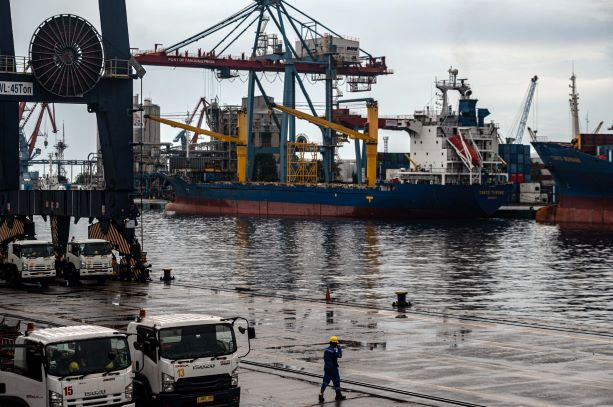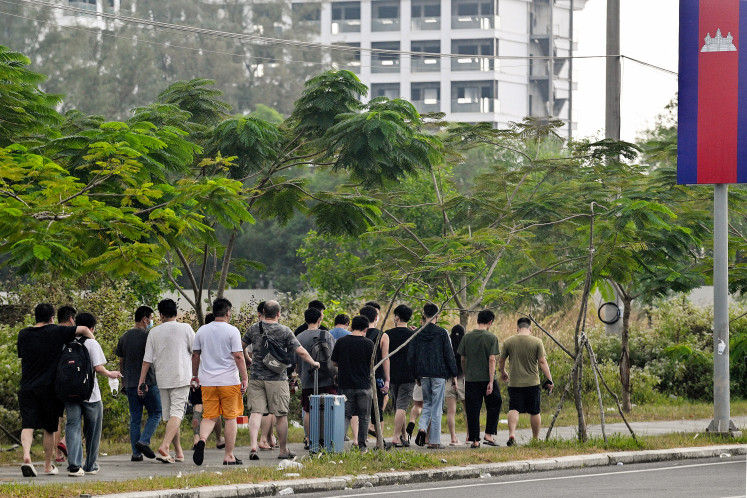Popular Reads
Top Results
Can't find what you're looking for?
View all search resultsPopular Reads
Top Results
Can't find what you're looking for?
View all search resultsGDP: Let’s keep our guard up
All three presidential candidates have promised GDP growth of 6 to 7 percent, as Jokowi did in the past.
Change text size
Gift Premium Articles
to Anyone
E
conomic growth in the third quarter was lower than many had expected, dropping below the 5 percent mark for the first time since the COVID-19 pandemic.
The projections of several major banks had pointed to gross domestic product (GDP) growth of 5.1 percent, which would have been broadly in line with the performance seen in the first half of the year.
Instead, economic output increased by 4.94 percent year-on-year (yoy). All things considered, that is not a bad result.
The global economy is fraught with rising debt levels and geopolitical risks, which are placing a heavy financial burden on countries and corporations around the world and ultimately hurting consumers as well as medium and small enterprises (MSEs).
Is it not surprising, therefore, that one reason for the disappointing GDP report was a weak export performance. Indonesia’s trade surplus in this year’s third quarter was just over half of what it was in the same quarter last year.
At home, the election season is heating up with just over two months until voting day. With no clear front-runner, there is no certainty about who will be in the State Palace by this time next year.
Confidence in the country’s political course and the predictability of laws and regulations are crucial for businesses to make long-term decisions, so some apprehension is expected as two terms of leadership by President Joko “Jokowi” Widodo end.
Without a doubt, this uncertainty is holding back some capital expenditure by investors who would otherwise be keen to proceed, for instance with building new factories or engaging in the future capital city.
Meanwhile, high interest rates are weighing on the property sector as prospective buyers struggle to secure affordable loans and as wage hikes have been rather modest by local standards this year.
Unsurprisingly, consumer confidence dropped in the third quarter, and household spending turned out to be lower than in the preceding three-month period.
Yet, despite this harsh global and domestic economic environment, Indonesia is still very likely to achieve 5 percent GDP growth this year.
More importantly, it is fair to expect faster growth once that environment improves, and there are grounds for optimism:
In the United States, the monetary policy discussion is already turning from further interest rate hikes to an expected loosening of the reins by the Federal Reserve. Many expect that to happen next year, which would change the mood in global markets to risk-on sentiment and should see more investment flowing into emerging economies like Indonesia.
Moreover, the wars in the Middle East and Ukraine will not last forever, with news reports pointing to increasing calls for a negotiated settlement in Ukraine and at least a ceasefire in Gaza.
Here in Indonesia, once the February elections are behind us, there should be less uncertainty over the country’s political situation.
It is not far-fetched, therefore, to assume a much-improved macroeconomic context for Indonesia by mid-2024, and in that case, the expectation for Jokowi’s successor would be to ramp up GDP growth to 5.5 percent, if not 6 percent.
Indeed, for what it is worth, all three presidential candidates have promised GDP growth of 6 to 7 percent, as Jokowi did in the past.
Of course, things could turn out differently. Explosive risks lurk in global debt levels, including public debt, and in a possible exacerbation of geopolitical tensions. Both of those are external factors from Indonesia’s perspective, given that domestic debt levels are deemed safe and the country has no role in global power games.
Yet, Indonesia’s current and future government must be prepared for the economic impact that a global crisis would undoubtedly have on the domestic economy.
Jokowi’s administration, assuming it does not mess things up in its final stretch, looks set to leave behind a solid economic foundation. Whoever picks up the baton next year may hope for the best but must prepare for the worst.











